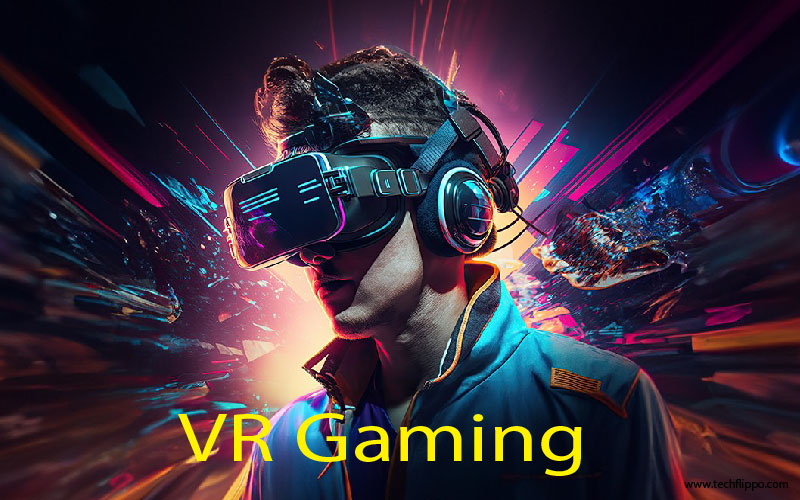How VR Gaming Transforms the Way We Play
Virtual reality gaming is not just a trend; it’s a revolutionary shift in how we experience entertainment. Imagine stepping into a world where you can fight dragons, explore alien planets, or solve mysteries alongside friends—all while sitting in your living room. This immersive technology takes gaming to another level, allowing players to interact with their environments like never before. As VR gaming continues to evolve, it transforms the way we engage with our favorite pastimes. It’s not merely about playing games anymore; it’s about living them. From thrilling adventures to serene explorations, the possibilities are endless. Let’s dive deeper into this fascinating realm and explore how VR gaming reshapes our interactions and experiences within virtual worlds.

The Evolution of VR Gaming Technology
VR gaming has come a long way since its inception. Early attempts in the 1990s were rudimentary, with clunky headsets and limited graphics. Gamers experienced more frustration than immersion during those years.
Fast forward to today, advancements in hardware have drastically improved user experience. Sleeker headsets boast high-resolution displays and motion tracking technology that creates truly engaging environments.
The integration of haptic feedback adds another layer of realism, allowing players to feel every impact or interaction within the game world. This sensory enhancement makes gameplay much more captivating.
Moreover, developments in software have expanded VR’s appeal beyond niche audiences. Today’s titles offer diverse genres that cater to various interests—everything from action-packed adventures to tranquil explorations.
As technology continues evolving, so does the potential for even richer experiences. The future holds exciting possibilities for how we interact with virtual realms.
Benefits of VR Gaming
VR gaming offers an immersive experience that transports players into fantastical worlds. This level of engagement enhances enjoyment and makes gameplay feel more lifelike.
One significant benefit is the physical activity involved. Many VR games require movement, turning gaming sessions into a workout. Players can exercise while having fun, improving their fitness levels without even realizing it.
Social interaction also thrives in virtual reality. Gamers can team up with friends or meet new people from across the globe, building communities around shared interests and experiences.
Moreover, VR stimulates creativity and problem-solving skills. Players navigate intricate scenarios that challenge their minds, encouraging them to think critically as they progress through different levels.
VR technology caters to various preferences with diverse genres available—from action-packed adventures to calming exploration experiences—ensuring there’s something for everyone in the realm of VR gaming.
Top VR Games in the Market
When exploring the realm of VR gaming, several standout titles capture attention. “Half-Life: Alyx” leads the pack with its immersive storytelling and innovative mechanics. Players navigate a richly detailed world filled with puzzles and combat.
Another gem is “Beat Saber,” blending rhythm and exercise in a vibrant package. Swinging virtual lightsabers to music offers both fun and fitness in an engaging format.
For those craving adventure, “The Walking Dead: Saints & Sinners” provides intense survival gameplay set in a zombie-infested universe. The decisions players make carry weight, impacting their journey significantly.
Don’t overlook “Moss,” where players guide a tiny protagonist through enchanting landscapes. Its charming design coupled with clever puzzles makes for an unforgettable experience.
These titles highlight the diverse experiences that VR gaming can offer, showcasing how this technology continues to push boundaries in interactive entertainment.
Impact on Traditional Gaming Industry
The rise of VR gaming has undeniably shaken up the traditional gaming industry. With its immersive experiences, it’s changing how players interact with games and each other.
Developers are now challenged to think outside the box. They must create content that leverages virtual reality’s unique capabilities. This shift pushes innovation forward, resulting in more engaging gameplay experiences.
Traditional consoles and PC gaming aren’t going anywhere. However, as VR gains traction, we see a blending of genres and platforms. Hybrid games that combine elements of both worlds are emerging.
Moreover, established franchises are experimenting with VR adaptations to capture new audiences while retaining their loyal fan base. The competition is fierce but healthy; it encourages growth across all sectors within the gaming universe.
While some purists may resist change, many players eagerly embrace this technology’s potential for deeper engagement and immersion in their favorite titles.

Challenges and Limitations of VR Gaming
Despite its thrilling potential, VR gaming faces several challenges. One major issue is the high cost of entry. Quality VR headsets and necessary hardware can be prohibitively expensive for many gamers.
Another significant limitation lies in physical space requirements. Users often need a substantial area to move around safely, which isn’t feasible for everyone. This restriction can hinder immersive experiences.
Motion sickness is another concern that affects players differently. Some may find prolonged use uncomfortable or disorienting, limiting their playtime.
Technical issues also arise frequently with VR setups, from connectivity problems to software glitches. These hurdles can frustrate even the most dedicated enthusiasts.
While game content has expanded significantly, it still lags behind traditional gaming offerings in variety and depth. Developers are gradually addressing this gap but progress remains slow as they navigate these complexities.
Future Possibilities for VR Gaming
The future of VR gaming is brimming with potential. As technology advances, we can expect even more immersive experiences. Imagine games that adapt to your emotions or physical movements in real-time.
Enhanced social interactions are also on the horizon. Players could engage in virtual worlds where friendships transcend geographic boundaries, creating communities like never before.
Moreover, the integration of artificial intelligence may allow for personalized narratives and challenges tailored to individual players’ skills and preferences. This level of customization will elevate engagement significantly.
Incorporating mixed reality elements might blur lines between the digital and physical realms. Picture a game that interacts with your living space while you explore distant worlds through your headset.
As hardware becomes more affordable and accessible, a broader audience will dive into VR gaming, fueling innovation across genres and platforms. The possibilities seem endless as creativity meets cutting-edge tech in this evolving landscape.
Conclusion
VR gaming represents a remarkable shift in how we perceive and engage with video games. The immersive experiences it offers are redefining entertainment, allowing players to step into virtual worlds like never before. As technology continues to advance, the possibilities for exploration and interaction within these realms seem limitless.
The benefits of VR gaming go beyond mere entertainment; they foster social connections and can even enhance learning through engaging simulations. With top-tier titles capturing the imagination of gamers everywhere, it’s clear that this medium is here to stay.
While traditional gaming faces challenges from this new format, it is also evolving alongside VR innovations. Yet, obstacles remain—accessibility issues and hardware limitations must be addressed as the industry grows.
As we look ahead, one cannot help but feel excitement about what lies in store for VR gaming. The fusion of creativity with cutting-edge technology promises to deliver experiences that transcend our current understanding of play. Whether you’re a seasoned gamer or just venturing into this realm, embracing VR could change your perspective on interactive entertainment forever.